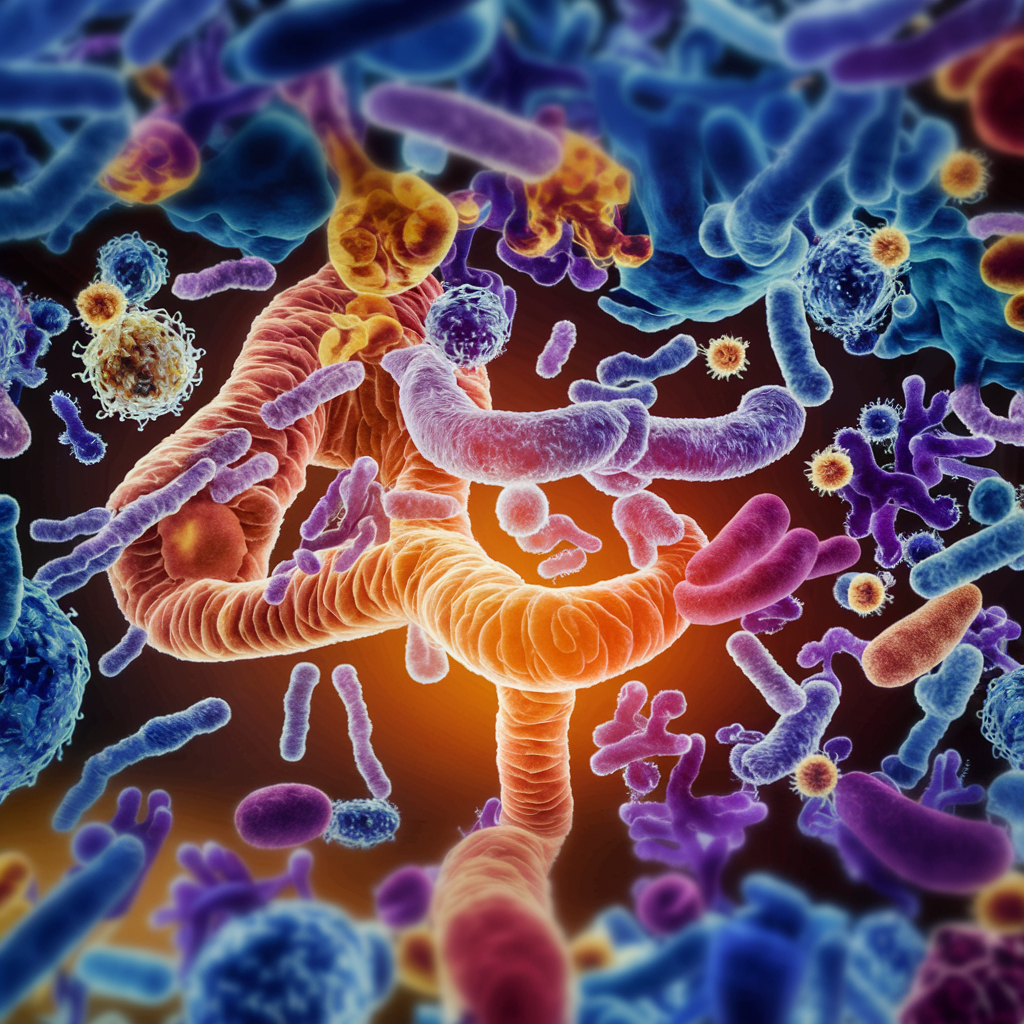Table of Contents
Introduction
Have you ever wondered why some people seem to age more gracefully than others?
Or why certain individuals appear to have more energy and vitality well into their golden years?
According to the United Nations, the number of people over the age of 65 worldwide in 2021 was 761 million, with that number expected to rise to 1.6 billion by 2050. A greater understanding of this population’s microbiome is thus of growing relevance in addressing human health and disease.
But the answer could be hiding in your gut. Recent research has uncovered a fascinating connection between the microbiome, the community of microorganisms living in our digestive system, and longevity.
This blog article will explore how maintaining a healthy gut may be the secret to living a longer, healthier life.
Understanding the Microbiome: Your Body’s Hidden Universe
Before we continue into the connection between the microbiome and longevity, let us take a moment to understand what exactly the microbiome is and why it is so important.
We are more than just human cells; we are walking ecosystems. Trillions of bacteria, fungi, viruses, and other microorganisms reside within us, particularly in our gut.
The microbiome refers to the trillions of microorganisms, including bacteria, fungi, viruses, arachea, and other microorganisms, that live in and on our bodies.The largest and most diverse population resides in our gut, mainly in the large intestine.
These microorganisms are not merely passive inhabitants; they are active participants in our physiological processes, influencing everything from digestion, producing essential vitamins and short-chain fatty acids ( SCFAs), immune function to mental health and ageing.
When this delicate balance is disrupted, a condition known as dysbiosis occurs leading to various health issues.

The Microbiome-Longevity Connection: What Science Tells Us
Research has shown that as we age, the diversity of our gut microbiome tends to decrease. This reduction in microbial diversity has been associated with various age-related health issues, including:
- Increased inflammation
- Weakened immune function
- Cognitive decline
- Cardiovascular problems
Interestingly, studies of centenarians (people who live to be 100 years or older) have found that they often maintain a more diverse microbiome compared to younger elderly individuals. These findings suggest that specific bacterial species and a healthy gut microbiota may contribute to a longer and healthier lifespan.
How the Microbiome Influences Longevity: Key Mechanisms
The Anti-Ageing Arsenal of the Gut Microbiota
The longevity-promoting effects of a healthy gut microbiota are likely mediated through various mechanisms:
1. Modulating Inflammation
Chronic, low-grade inflammation is a major contributor to ageing and age-related diseases. A balanced microbiome can help reduce inflammation in several ways:
- Strengthening the gut barrier to prevent harmful substances from entering the bloodstream.
- Regulating the immune system to prevent overactive inflammatory responses.
- Beneficial bacteria can dampen inflammation by producing anti-inflammatory compounds and interacting with immune cells to suppress the release of pro-inflammatory molecules. For example, Bifidobacterium and Lactobacillus species, commonly found in fermented foods, are known for their anti-inflammatory properties.
- Maintaining a balanced gut microbiome with a higher abundance of anti-inflammatory bacteria is crucial for controlling inflammation and promoting healthy ageing.
By keeping inflammation in check, a healthy microbiome may slow down the ageing process and reduce the risk of age-related diseases.
2. Enhancing Antioxidant Defences
- Oxidative stress, caused by an imbalance between free radicals and antioxidants in the body, is a major contributor to ageing. While the mechanisms are not fully understood, certain gut bacteria might help enhance the body’s antioxidant defences by producing antioxidant enzymes or stimulating the production of antioxidants by the host. This can protect cells from damage and potentially slow down the ageing process.
3. Strengthening Gut Barrier Integrity
- A weakened gut barrier allows harmful substances to leak into the bloodstream, contributing to inflammation and other health problems.
- Beneficial gut bacteria, particularly those that produce SCFAs like butyrate, play a major role in maintaining gut barrier integrity.
- Butyrate provides energy for cells lining the gut, strengthening the tight junctions between them and preventing leaks.
4. Producing Beneficial Metabolites
- The gut microbiome produces a vast array of metabolites that influence host health and ageing.
- SCFAs, beyond their role in gut barrier integrity, influence energy metabolism, immune function, and even brain health.
- Other microbial metabolites, like secondary bile acids and indoles, have been linked to longevity in some studies.
5. Influencing Cellular Processes
- Nutrient-sensing pathways, like insulin/IGF-1 signalling (IIS), AMPK signalling, and mTOR signalling, play roles in regulating metabolism, cell growth, and lifespan. The gut microbiota might indirectly influence these pathways through its impact on nutrient availability and metabolism, as well as through the production of metabolites.
- Additionally, the gut microbiome might play a role in regulating cellular senescence, a process where cells stop dividing but do not die, accumulating in tissues with age and contributing to age-related decline.
6. Nutrient Absorption and Production
As we age, our bodies become less efficient at absorbing and using nutrients from our food. A healthy microbiome can help counteract this by:
- Breaking down complex carbohydrates that our bodies cannot digest on their own
- Producing essential vitamins, such as vitamin K and certain B vitamins
- Enhancing the absorption of minerals like calcium and magnesium
This improved nutrient absorption and production can help maintain overall health and vitality as we age.
7. Immune System Support
Boosting Immune Function
Approximately 70% of the immune system resides in the gut, where it is constantly interacting with the microbiome. Beneficial gut bacteria play a key role in training the immune system to distinguish between harmless and harmful pathogens. This interaction promotes immune resilience, reducing the risk of age-related diseases and infections. By supporting a balanced microbiome, the immune system remains more responsive and less likely to become overactive, which is crucial for longevity.
A strong immune system is crucial for longevity, as it helps protect us from infections and diseases. The microbiome plays a vital role in supporting our immune function by:
- Training our immune cells to recognise and respond to threats
- Producing compounds that enhance immune cell activity
- Competing with harmful pathogens for resources, preventing their growth
Studies from as early as the 1960’s have indicated a decrease in immune function in ageing adults. This process, now known as immunosenescence, is associated with a decline in immune system function that leads to an accumulation of pro-inflammatory cytokines. The increased inflammatory state in elderly populations is now commonly referred to as “inflammaging”. Pro-inflammatory states place patients at higher risk for a variety of conditions such as autoimmune and cardiovascular diseases, as well as infections.[1]
By maintaining a robust immune system, a healthy microbiome can help us stay healthier for longer.
8. Supporting Metabolic Health
The gut microbiome plays an active role in regulating metabolism. Certain microbes assist in breaking down food and extracting nutrients, supporting processes like glucose metabolism and lipid regulation. An imbalanced microbiome has been linked to metabolic disorders such as obesity and type 2 diabetes, which can reduce life expectancy. Some bacteria, like Akkermansia muciniphila, have shown promise in supporting metabolic health by improving gut lining integrity and aiding weight regulation, potentially contributing to a longer lifespan.
The microbiome’s impact on longevity is not just a matter of correlation – there are several specific ways in which a healthy gut can promote a longer life.
The Role of Beneficial Bacteria
Promising Microbes for Longevity
- Akkermansia muciniphila: Known for its role in maintaining the gut lining, Akkermansia muciniphila has shown potential in reducing inflammation and supporting metabolic health. This bacterium feeds on mucus within the gut, helping maintain a healthy gut barrier and potentially extending lifespan through better gut integrity.
- Bifidobacterium: A common probiotic strain, Bifidobacterium is abundant in infants and declines with age. In older adults, it is known to support immunity, reduce inflammation, and improve digestion. Increasing levels of Bifidobacterium in the gut may help counteract some of the ageing-related changes in the microbiome.
- Lactobacillus: This group of bacteria supports digestion and immune function. Research suggests Lactobacillus may protect against certain infections and even aid in mental health, contributing to better quality of life and potentially increasing healthspan.
- Faecalibacterium prausnitzii: This bacteria produces butyrate, a short-chain fatty acid with anti-inflammatory properties.
- Eubacterium rectale: Another butyrate producer with anti-inflammatory effects, supporting gut health and potentially reducing frailty
- Christensenellaceae: Enriched in centenarians, potentially contributing to longevity through its role in maintaining gut health.
- Roseburia: Associated with longevity traits, possibly due to its role in producing beneficial metabolites like butyrate
- Bacteroides: Dominant in centenarians, similar to younger individuals.
- Methanobrevibacter smithii: Increased in centenarians, contributing to metabolic health.
Encouraging the growth of these beneficial bacteria through diet and lifestyle choices may contribute to a longer, healthier life.
Centenarians from different regions exhibit common gut microbiome signatures, despite geographical and cultural differences. These include:
- Increased Diversity: Higher microbial diversity is a consistent feature among centenarians, contributing to resilience against age-related diseases.
- Ruminococcaceae: This family of bacteria is commonly enriched in centenarians, associated with healthy aging.
- Bacteroides: Often dominant in centenarians, similar to younger individuals, indicating a youthful gut microbiome signature.
- Akkermansia and Christensenellaceae: Frequently found in higher abundance, linked to metabolic health and longevity
In frail older adults, several gut bacteria are commonly found in altered abundance:
- Increased Abundance: Actinobacteria, Proteobacteria, Verrucomicrobia, and Synergistetes are more prevalent in frail individuals. Specific genera such as Bifidobacterium, Eggerthella lenta, and Flavonifractor plautii are also increased.
- Decreased Abundance: Beneficial bacteria like Faecalibacterium prausnitzii, Roseburia, and Prevotella are reduced in frail older adults. Other genera with decreased presence include Coprococcus and Blautia.
These changes can contribute to inflammation and other health issues associated with frailty.
Another growing area of research is exploring the centenarian virome, with early results suggesting increased viral diversity and unique genera enrichment that distinguish centenarians from other older adults (> 60).

Strategies for a Longevity-Boosting Microbiome
Eat a Diverse, Plant-Rich Diet
One of the best ways to promote a healthy, diverse microbiome is to eat a wide variety of plant-based foods.
- Fibre: Plant foods are rich in fibre, which serves as food for beneficial gut bacteria. Aim for 25-30 grams of fibre daily.
- Polyphenols: These plant compounds have antioxidant properties and can stimulate the growth of beneficial bacteria.
- Variety: Different types of plants support different types of bacteria, so eating a diverse diet helps maintain microbial diversity.
- Diets like the Mediterranean diet, rich in plant-based foods and healthy fats, are associated with a healthier gut microbiota and a lower risk of age-related diseases.
Try to include a rainbow of fruits and vegetables in your diet, along with whole grains, legumes, nuts, and seeds.
Incorporate Fermented Foods
Fermented foods are a great source of beneficial bacteria that can help populate your gut. Some examples include:
- Yogurt (look for varieties with live active cultures)
- Kefir
- Sauerkraut
- Kimchi
- Kombucha
- Miso
Aim to include at least one serving of fermented foods in your diet each day.
Probiotics and Prebiotics
Probiotics are live microorganisms, typically bacteria, that can confer health benefits when consumed in adequate amounts. Prebiotics are non-digestible fibres that selectively stimulate the growth and activity of beneficial gut bacteria.
Incorporating probiotic-rich foods, like yogurt and fermented vegetables, and prebiotic-rich foods, like onions, garlic, leeks, oats, bananas, and asparagus into the diet can support a healthy gut microbiome.
Studies have shown that probiotics and synbiotics (a combination of probiotics and prebiotics) can increase the abundance of beneficial bacteria like Bifidobacterium, Faecalibacterium prausnitzii, and Lactobacillus.
Limit Processed Foods and Added Sugars
Highly processed foods and those high in added sugars can disrupt the balance of your microbiome. These foods often lack the fibre and nutrients that beneficial bacteria need to thrive, and can instead promote the growth of harmful bacteria.
Try to focus on whole, minimally processed foods as much as possible, and limit your intake of sugary snacks and drinks.
Stay Hydrated
Drinking plenty of water is essential for overall health, including the health of your microbiome. Water helps:
- Move food through your digestive system
- Maintain the mucus layer in your intestines, which supports beneficial bacteria
- Flush out toxins and waste products
Aim to drink at least 8 glasses of water per day, or more if you are physically active or live in a hot climate.
Manage Stress
Chronic stress can have a negative impact on your microbiome, potentially reducing diversity and promoting inflammation. Some stress-management techniques to consider include:
- Meditation or mindfulness practices
- Regular exercise
- Spending time in nature
- Engaging in hobbies or activities you enjoy
Manage Sleep
Optimal sleep duration and quality are crucial for longevity. Sleeping 7-9 hours per night is associated with the lowest risk of all-cause mortality. Both insufficient (less than 6 hours) and excessive sleep (more than 9 hours) increase mortality risk. Quality sleep, characterised by regularity and minimal disturbances, further enhances life expectancy. Sleep regularity, or consistent sleep-wake timing, is a stronger predictor of mortality risk than sleep duration alone. Adopting good sleep habits can add up to five years to life expectancy for men and 2.5 years for women.
Be Mindful of Antibiotic Use
While antibiotics can be life-saving when necessary, overuse can disrupt your microbiome. If you do need to take antibiotics:
- Only use them when prescribed by a healthcare professional
- Complete the full course as directed
- Consider taking a probiotic supplement during and after antibiotic treatment to help restore beneficial bacteria
Exercise Regularly
Regular physical activity has been shown to promote a healthy, diverse microbiome. Exercise can:
- Increase the production of short-chain fatty acids, which have anti-inflammatory effects
- Enhance the growth of beneficial bacteria
- Improve gut motility, which helps maintain a healthy balance of microorganisms
Aim for at least 150 minutes of moderate-intensity exercise or 75 minutes of vigorous-intensity exercise per week.
The Future of Microbiome Research and Longevity
As our understanding of the microbiome and its impact on health and longevity continues to grow, exciting new avenues for research and potential therapies are emerging.
Personalised Microbiome Interventions
In the future, we may see more personalised approaches to microbiome health. This could involve:
- Detailed microbiome testing to identify imbalances or deficiencies
- Customized probiotics or prebiotics tailored to an individual’s specific needs
- Personalised dietary recommendations based on microbiome composition
Faecal Microbiota Transplants
While currently used primarily for treating certain gut infections ( clostridioides difficle), faecal microbiota transplants (FMT) are being studied for their potential to address a wide range of health issues, including some age-related conditions
This has led some to speculate whether the microbiome from a young, healthy donor can be transplanted into an elderly individual to reverse some of the effects of unhealthy ageing.
As research progresses, we may see FMT or similar therapies used more broadly to promote health and longevity.
Microbiome-Based Therapeutics
Researchers are working on developing new drugs and therapies based on our understanding of the microbiome. These could include:
- Probiotics engineered to produce specific beneficial compounds
- Drugs that target or modulate specific microbial species or their metabolites
- Therapies that aim to restore microbial diversity in aging individuals
- Emerging technologies like metagenomic sequencing
Conclusion: Embracing the Power of Your Microbiome
As we have explored throughout this post, the connection between the microbiome and longevity is a fascinating and promising area of research. While there is still much to learn, it is clear that maintaining a healthy, diverse microbiome can play a significant role in promoting overall health and potentially extending lifespan.
By adopting habits that support a healthy gut – such as eating a diverse, plant-rich diet, staying active, managing stress and sleep, and being mindful of factors that can disrupt our microbial balance – we can take proactive steps towards nurturing our microbiome and potentially increasing our chances of living a longer, healthier life.
Remember, it is never too late to start caring for your microbiome. Whether you are in your 20s or your 80s, making positive changes to support your gut health can have far-reaching benefits for your overall well-being and longevity.
So why not start today? Your trillions of tiny microbial friends will thank you, and you might just find yourself feeling healthier, more energetic, and better equipped to face the challenges of ageing.
Here is to a long, healthy life – powered by a thriving microbiome!
References
1.Chen, L.A., Boyle, K. The Role of the Gut Microbiome in Health and Disease in the Elderly. Curr Gastroenterol Rep 26, 217–230 (2024). https://doi.org/10.1007/s11894-024-00932-w
2. Int. J. Environ. Res. Public Health 2023, 20(10), 5845; https://doi.org/10.3390/ijerph20105845
3. Nutrients 2020, 12, 3759; doi:10.t3390/nu12123759
4. Cell Host & Microbe 28, August 12, 2020. https://doi.org/10.1016/j.chom.2020.07.013
5. Santoro, A., Ostan, R., Candela, M. et al. Gut microbiota changes in the extreme decades of human life: a focus on centenarians. Cell. Mol. Life Sci. 75, 129–148 (2018). https://doi.org/10.1007/s00018-017-2674-y
6. He, D., Liu, L., Zhang, Z. et al. Association between gut microbiota and longevity: a genetic correlation and mendelian randomization study. BMC Microbiol 22, 302 (2022). https://doi.org/10.1186/s12866-022-02703-x
This article is not intended to replace professional medical advice. If you have specific health concerns or conditions, consult with a healthcare professional for personalised guidance.
Disclaimer: The information provided in this article is for educational purposes only and should not be considered as medical advice. Always consult with a healthcare professional before making any changes to your diet or lifestyle.



